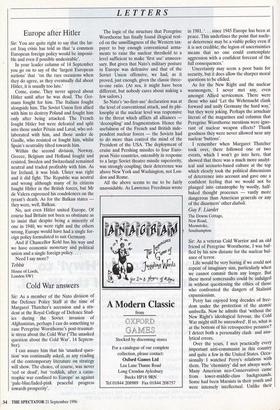LETTERS
Europe after Hitler
Sir: You are quite right to say that the lat- est Iraq crisis has told us that `a common European foreign policy would be impossi- ble and even if possible undesirable'.
In your leader column of 14 September you go on to say of the 'largest European nations' that 'on the rare occasions when they do agree, as they eventually did about Hitler, it is usually too late.'
Come, come. They never agreed about Hitler until after he was dead. The Ger- mans fought for him. The Italians fought alongside him. The Soviet Union first allied with him to destroy Poland and fought him only after being attacked. The French fought Hitler but were defeated and split into those under Main and Laval, who col- laborated with him, and those under de Gaulle, who resisted or fought him, whilst Spain's neutrality tilted towards him.
Within the second division, Norway, Greece, Belgium and Holland fought and resisted, Sweden and Switzerland remained neutral and traded profitably with him. As for Ireland, it was Irish. Ulster was right and it did fight. The Republic was neutral and wrong although many of its citizens fought Hitler in the British forces, but Mr de Valera expressed his condolences on the tyrant's death. As for the Balkan states they were, well, Balkan.
No, not even Hitler united Europe. Of course had Britain not been so obstinate as to insist that despite being a minority of one in 1940, we were right and the others wrong, Europe would have had a single for- eign policy formulated to suit Germany.
And if Chancellor Kohl has his way and we have economic monetary and political union and a single foreign policy.. ..
Need I say more?
Tebbit
House of Lords, London SW1


















































































 Previous page
Previous page